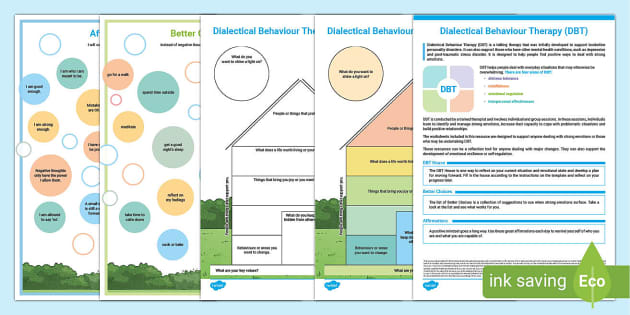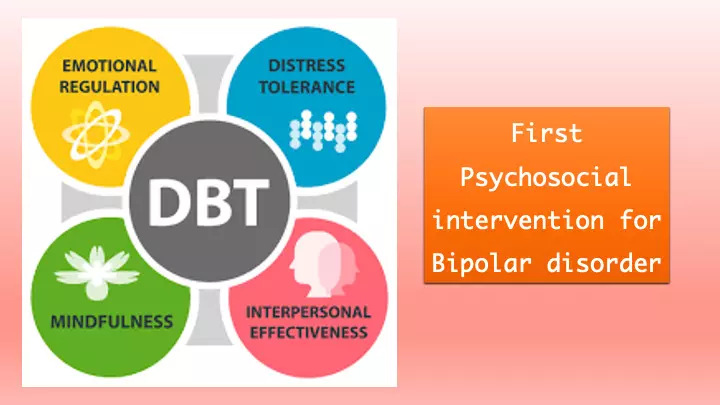Empowerment Via DBT London: Structure Resilience, Searching For Balance
Wiki Article
Using the Power of Dialectical Behaviour Therapy (DBT) Providers for Sustainable Emotional Equilibrium and Improved Relationships
In a globe where psychological health and preserving healthy connections are crucial parts of a fulfilling life, the utilization of Dialectical Behavior Therapy (DBT) services has emerged as a sign of expect several people. The structured and evidence-based strategy of DBT uses a path towards lasting emotional balance and improved communications with others. By focusing on core principles, people can establish vital skills for controling feelings, enhancing social effectiveness, and fostering mindfulness. The real power of DBT exists not just in understanding these concepts but in the useful application of techniques in day-to-day life. As we browse the intricacies of human emotions and relationships, taking advantage of the possibility of DBT solutions becomes a transformative journey worth checking out even more.
Comprehending the Core Principles of DBT
Dialectical Habits Treatment (DBT) is founded upon a collection of core principles that underpin its therapeutic technique to advertising psychological balance and emotional wellness. Among the fundamental concepts of DBT is dialectics, which stresses the synthesis of apparently opposite concepts to reach a more well balanced viewpoint. This includes identifying and approving the oppositions and stress within oneself, causing a greater sense of consistency and understanding. Mindfulness is another core principle of DBT, focusing on being fully present in the minute without judgment. By cultivating mindfulness, individuals can create a heightened understanding of their ideas, emotions, and habits, allowing for greater self-regulation and psychological control.

Validation is additionally indispensable to DBT, stressing the relevance of accepting and recognizing one's experiences and feelings as valid. Through recognition, people can discover to navigate their feelings with concern and understanding, cultivating self-acceptance and psychological development. Last but not least, behaviorism plays a crucial function in DBT, highlighting the adjustment of maladaptive behaviors through support and skill-building. By including these core principles right into treatment, DBT provides a extensive and reliable strategy to promoting psychological health and mental strength.
Establishing Psychological Regulation Skills
Psychological regulation skills are essential elements of Dialectical Actions Therapy (DBT) that allow people to effectively manage their feelings and navigate challenging situations with durability. These abilities incorporate the capability to determine and understand one's feelings, tolerate distress, control extreme feelings, and act in accordance with individual values even despite psychological turmoil. Creating psychological law abilities involves learning mindfulness strategies to stay present in the moment, understanding the triggers that lead to emotional dysregulation, and carrying out coping techniques to modulate psychological reactions.
Enhancing Interpersonal Efficiency
Improving interaction skills and promoting significant connections with others are integral elements of developing social performance within the framework of Dialectical Habits Therapy (DBT) DBT teaches individuals how to connect successfully, browse interpersonal challenges, and create methods for solving conflicts in a positive way.
One secret part of enhancing social efficiency in DBT is learning to acknowledge and manage emotions in social interactions. DBT London. By enhancing psychological recognition, people can react to others in a much more compassionate and understanding method. Furthermore, DBT highlights the relevance of practicing mindfulness in social relationships, encouraging individuals to be existing in their interactions and fully involve with others
Practicing Mindfulness Techniques
Developing a regular mindfulness practice is necessary for people undergoing Dialectical Behavior modification (DBT) to cultivate emotional law and improve their social efficiency. Mindfulness methods, a core component of DBT, involve taking note of the present moment without judgment. Through mindfulness, individuals can become more knowledgeable about their ideas, feelings, and bodily experiences, allowing them to respond to circumstances with greater clearness and control.One secret mindfulness technique made use of in DBT is mindfulness reflection. This method entails concentrating on the breath or a certain things while recognizing and letting go of any disruptive ideas. By incorporating mindfulness reflection into their everyday routine, individuals can educate their minds to stay existing and decrease sensitivity to stress factors.
One more vital element of practicing mindfulness in DBT is the principle of extreme acceptance. Radical approval involves completely embracing reality as it is, even when important source it is agonizing or difficult. By approving today minute without judgment, individuals can decrease their suffering and include favorable change.
Using DBT Techniques in Every Day Life
Building upon the structure of mindfulness techniques such as reflection and extreme acceptance, More about the author people can incorporate DBT strategies right into their daily lives to foster emotional equilibrium and improve their social skills. Furthermore, social performance abilities educated in DBT can assist people connect their needs assertively, established borders, and maintain healthy and balanced connections. By regularly using these DBT techniques in day-to-day life, individuals can experience lasting emotional equilibrium and boost their overall wellness.Final Thought

Emotional regulation abilities are necessary elements of Dialectical Actions Treatment (DBT) that make it possible for individuals to properly manage their feelings and navigate challenging scenarios with strength.With DBT solutions, people can grow a deeper recognition of their feelings, recognize patterns of habits that contribute to psychological distress, and acquire useful tools to regulate their feelings constructively.Creating a consistent site here mindfulness method is important for people undergoing Dialectical Habits Treatment (DBT) to cultivate psychological regulation and improve their social efficiency.Structure upon the structure of mindfulness strategies such as meditation and extreme approval, people can integrate DBT techniques into their day-to-day lives to foster psychological equilibrium and improve their social skills. By comprehending the core concepts of DBT, developing psychological policy abilities, boosting interpersonal efficiency, exercising mindfulness strategies, and using DBT strategies in everyday life, people can experience substantial improvements in their general well-being and connections.
Report this wiki page